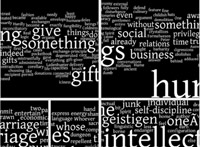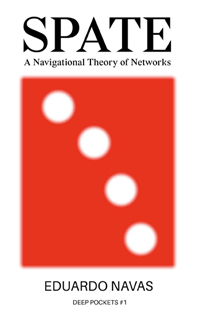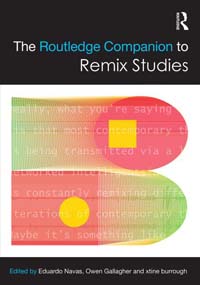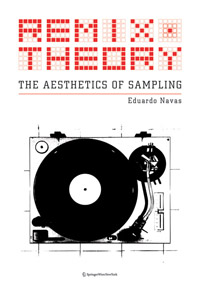“Mashup the Archive and Dividual Agency,” essay for exhibit at Iwalewahaus
Image: photo of copies of art catalogue for the exhibition Mashup the Archive. My thanks to Nadine Seigert and Sam Hopkins for inviting me to participate in the events for the opening during the month of June 2015.
This text is different from others I have written. It is in part a transcription of a presentation I gave for a roundtable discussion at Bayreuth for the exhibit Mashup, on June 1, 2015.[1] I expanded the basic transcription to revisit my definitions of remix. What is unique of this text is the elaboration of the remix diagram [Figure 1], which in the past I have included in different publications as a visual reference, but have not referred to directly as each term is discussed. Some of the material that follows below was not part of my actual presentation but is added to emphasize remix as a variable at play in Mashup the Archive. The last part of this essay, in particular, is based on the discussion that took place during our panel presentation. It is a reflection on questions about the future of the archive, and who can use it. The text itself, in a way, is a selective remix because its foundation is the transcription of my roundtable presentation to which I added and deleted selected material. This basic form of remix is explained further in what follows. Because of its hybrid format, the text may appear to go on brief tangents, or include comments that are normal in a conversation, but which may not be expected in a formal paper. This text effectively functions between spaces. It borrows from moments in time and makes the most of them to put into practice the theories upon which it reflects.
Introduction
I would like to start by thanking everyone for making this roundtable possible, Sam Hopkins, Nadine Siegert, and Ulf Vierke from the Iwalewahaus, and my fellow panel participants Beatrice Ferrara, Nina Huber, and Mark Nash who joined me during the roundtable discussion. My focus on this occasion is on the interrelation of the mashup, the archive and what I will call dividual agency[2] in accordance to principles of remixing. I will first define remix and the mashup in music and relate it to contemporary culture in general; then I will evaluate the mashup in relation to the archive and authorship by generally reflecting on the exhibit at the Iwalewahaus.
[1] I thank Lucie Ameloot for the transcription.
[2] I take the concept of the dividual from Gilles Deleuze, who discusses the concept of a set (a closed system), which changes as it is divided into parts. See Gilles Deleuze, Cinema 1: The Movement Image (Minneapolis: Minnesota Press, 1986), 14-15.









